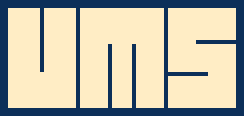
Undergraduate Mathematics Symposium
Saturday, November 16, 2024
University of Illinois at Chicago
Organized by Emily Dumas and Kevin Tucker
About the symposium
The Undergraduate Mathematics Symposium at UIC is an annual one-day
meeting focusing on undergraduate mathematical research and
education. The meeting features plenary lectures by mathematical
researchers and a poster session where students present results from undergraduate mathematical research projects.
The next UMS will be held on November 16, 2024. It will feature a poster session for undergraduate researchers and two invited plenary lectures by mathematical researchers. Information about applying to present a poster can be found below.
Plenary speakers
- Noah Giansiracusa (Bentley University)
The Mathematics of Misinformation
Abstract:
In this talk I'll gently survey various roles mathematics (often, but not always, in the form of machine learning) plays in our information ecosystem. I'll discuss the math behind YouTube's recommendation algorithm and Facebook's News Feed algorithm and the impact the choice of objective function has on what society sees and thinks. I'll explain how graph theory is used to quantitatively study the spread of news and misinformation on social media, and also how it is used to detect bot accounts. And I'll explain the math behind deepfake photos and videos and text generating AI. No prior knowledge of machine learning or data science will be assumed, and the math will be accessible to all undergraduates.
- Osama Khalil (UIC)
The Shape of Numbers
Abstract:
This talk will explore through several down-to-earth examples how one can think about donuts and primes through the same mathematical lens of topology. The emphasis will be on the pleasing, and often powerful, unity among seemingly disparate areas of mathematics.
Poster session
Undergraduates who have completed an REU, summer program, or other supervised mathematical research experience can apply to present a poster at UMS.
We are no longer accepting poster applications.
Attending the symposium
Everyone is welcome to attend, but please register so we can plan for the correct number of participants.
We do not have travel funding for non-presenter participants.
Schedule and locations
The symposium will be held in the Science and Engineering Offices (SEO) building. The symposium will start at 9am and will end by 3pm.
The schedule of events is shown below:
| Saturday, November 16 |
| Time | Event | Location |
| 9:00 - 9:30am |
Sign-in and coffee |
SEO 300 |
| 9:30am |
Osama Khalil |
SEO 636 |
| 10:45am |
Poster session |
| 12:00pm |
Lunch |
SEO 300 |
| 1:30pm |
Noah Giansiracusa |
SEO 636 |
| 2:45pm |
End of symposium |
A detailed schedule will be posted closer to the day of the event.
Code of Conduct
Speakers and participants in UMS must agree to the UMS Code of Conduct. Its purpose is to help the organizers ensure a safe, respectful, and welcoming environment for everyone.
Acknowledgment
UMS is supported in part by a grant from the National Science Foundation: NSF RTG 2037569.

